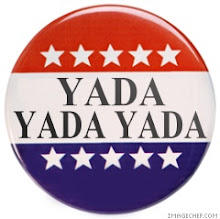I won't comment on the proposition that the men who were honored with the Congressional Medal of Honor yesterday had been overlooked because they had been identified with some less favored ethnic group. It takes away from their individual stories and suggests that by honoring them we're doing them some sort of favor by elevating them to the level of "regular" Americans.
Having listened yesterday to the long recitation of the deeds of these belated medal recipients, I don't doubt that they all earned the long delayed distinction in full. In fact I felt that although I had only turned on the TV for a quick check of the stock market, I was duty bound as an American to watch the entire ceremony -- and I did. None of these men seem to have borne a grudge for having been overlooked and that's more to their credit and speaks more to their character, but no one who endured such risk or paid such a price should ever be forgotten even by those like me who may not have approved of the actions that put them in harm's way and cost so many of them their lives.
We're a nation that loves to say "support the troops" instead of supporting their interests while they serve and afterwards. There's far more to support than pestering anyone in uniform with applause while voting for politicians who constantly attack their benefits. Applause is cheap, medals are inexpensive. Remembering what happens when we go to war; remembering what apparently ordinary men have done and can do when something needs to be done and despite the danger or the personal consequences, is a part of the obligation they place on us and the least we can do in return.
Of all the things we are urged never to forget by people who foment wars, such men, such deeds are the most often and soon forgotten. I would remember them individually if I could, but not so much as heroes but as another reminder of the value of human life; of how much an ordinary man can do, of how far beyond common experience he can rise and of how little his value has to do with the petty ways we measure our fellow Americans.
None of the survivors became millionaire industrialists or could afford to purchase political favors. Perhaps some could be described by the 'Patriots' on the Right as takers looking for handouts from the government at our expense. Can we ignore the lesson that the measure of a man is not money, nor knowledge, nor industry? Can we remember that the man who mows your lawn, fixes your BMW or drives a school bus -- even the man who has never been able to hold a job may be, in such a staggering way, a better man than we are, that I am?
Wednesday, March 19, 2014
Subscribe to:
Post Comments (Atom)

2 comments:
Good article. But I think that we do need to keep the racism in mind. For one thing, it doesn't take away from their accomplishments. It highlights the fact that there are doubtless far more minority group members who weren't honored who should have been. In the rush to fix such an embarrassment, I'm sure many were left out. If conservatives want to think the opposite, well that says everything about them and nothing about the men.
The other issue, is that the lack of these honors shows that to a large extent, "honor the troops" has always been a crock: more about appearances than real affection. If skin color mattered more than an individual's valor, then it didn't mean much.
Regardless, it was important that we had the ceremony. But it was heartbreaking that 85% of them were already dead.
I wasn't commenting on the racism factor only because I think it's so obvious I didn't need to.
Yes, it's sad that so few could receive recognition personally, but often the Medal is awarded posthumously anyway. You could see the pride on the faces of family though -- maybe more emotion than the living survivors who seemed rather stoic.
Yes, I'm sick of the "support the troops" nonsense as though it weren't the Government's job to provide support. These people aren't a charity. They don't owe us, we owe them.
An integrated military is progress at least. It's important to remember that it wasn't so during WW II and that doing so has been a good thing in terms of opportunities and I know people who after having worked and fought and lived with people they previously looked down on, learned to get over it.
It wasn't those all-American, star spangled "support the troops" love it or leave it Republicans who did that either
Post a Comment